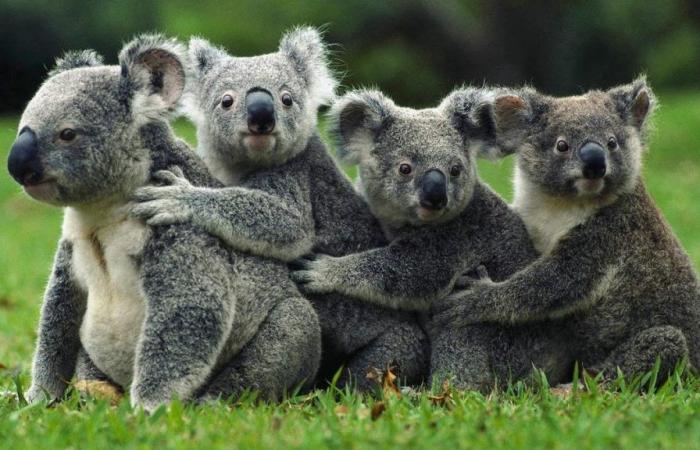The Koalas They are a species that arouses great interest due to their peculiar lifestyle and unique characteristics. Recently, a study has revealed that These iconic animals have an amazing ability to anticipate the hottest days and adjust to better withstand high temperatures..
For the first time, scientists have observed that Wild koalas regulate their body temperature just before the hottest days of summer. According to the leader of the research, Valentina Mella, from the University of Sydney, Koalas significantly lower their body temperatures during the mornings.
For two weeks, in Australia, a team of scientists observed a colony of wild koalas in the wild during the hottest time of the year 2019. On the hottest day of the study, with an ambient temperature of 40.8ºC, the scientists recorded the temperature highest body temperature ever measured in a koala: also 40.8ºC.
However, that same morning, the lowest temperature ever recorded for a koala was measured: 32.4ºC, which the study’s authors say shows that koalas can regulate their body temperature to a greater extent than previously thought.
“This clearly suggests that koalas predict the hottest days from morning conditions and adjust their core temperatures accordingly. “We’ve never seen this kind of behaviour in koalas before,” Mella points out. They lower their body temperature well below average during the cooler conditions of the morning.
The self-regulation of body temperature observed in koalas implies that they are able to predict extreme hot days based on night and early morning conditions. This adaptive behavior could be crucial in reducing the loss of water through evaporation, a vital resource in your environment.
Hugging the trees
“It seems that self-regulation of body temperature could play a more important role in survival on hotter days than known behavioral tactics, such as tree hugging,” Mella notes.
Koalas generally maintain their average body temperature at 36.3ºC, within a range of 2.4ºC. On hot days, a adaptive strategy Starting with a lower body temperature allows koalas to let their body temperature rise along with the air temperature, rather than expending resources trying to keep their temperature strictly within the normal range.
As global climate change causes temperatures to rise, koalas’ survival techniques could become dangerous. Temperatures above 40ºC can be fatal for mammals that feed on leaveslike koalas.
These animals have Physiological and behavioral methods to self-monitor your body temperaturesuch as their highly insulating coat, the ability to produce concentrated urine to conserve water, and a low metabolism that reduces heat production.
Additionally, they pant and lick their fur to facilitate evaporative cooling and seek out cooler microhabitats, adopting tree-hugging postures to promote heat exchange with cooler surfaces.
Previous research also recorded koalas drinking available water during very hot days, a previously unknown behavior.
“While we observe hug the trees On hot days, this did not appear to significantly reduce core body temperature. This could be partly due to the type of trees, but it does not appear to be a central strategy for modulating body temperature in this population of koalas,” Mella says.
Remarkable adaptive intelligence
The average age of the koala population studied is high and, like many colonies, it suffers from chlamydia disease. But all the koalas observed in the study were alive six months later, indicating that body temperature modulation is an effective survival technique.
However, the future is not entirely optimistic. According to global climate models, Scientists predict an increase in dry and warm weather, along with increased frequency, duration and severity of droughts.This could push koalas and other leaf-eating, tree-dwelling mammals toward their thermal limit.
“Our results reinforce the importance of climate mitigation“to ensure the future survival of koalas,” Mella stresses. Koalas’ ability to regulate their body temperature could be a crucial adaptation for their survival in a changing climate, but it also underscores “the urgent need to address climate change to protect these and other vulnerable species.”
The research, published in ‘Conservation Physiology’, provides deep insight into How koalas cope with extreme heat and the implications of climate change on their survival“The ability of these marsupials to anticipate and prepare for the hottest days is impressive and suggests that they have a remarkable adaptive intelligence“, highlight the authors.
However, rising global temperatures pose “serious challenges” that could overcome these natural adaptations. The conservation of koalas and other herbivorous mammals requires “a deep understanding of their physiological limits and a Immediate action to mitigate the effects of climate change“, the researchers point out.
Reference report: https://academic.oup.com/conphys/article/12/1/coae032/7683109
…………….
Contact of the Environment section: [email protected]






